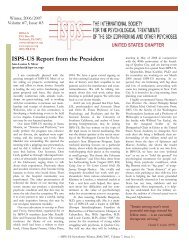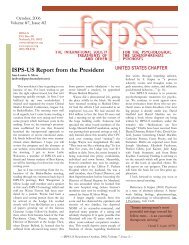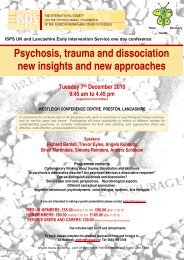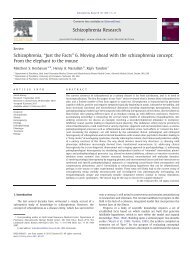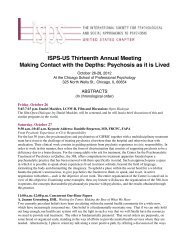Spring 2011 - ISPS-US
Spring 2011 - ISPS-US
Spring 2011 - ISPS-US
Create successful ePaper yourself
Turn your PDF publications into a flip-book with our unique Google optimized e-Paper software.
16<br />
Continued from page 15<br />
Projection in the Family and in the Workplace (panel)<br />
Cathleen M. Morey, LICSW: The Influence of Intergenerational Family Dynamics on Psychosis and Suicidal Behavior<br />
This presentation will demonstrate the value of conceptualizing suicidal behavior and psychosis from a psychodynamic theoretical<br />
perspective that includes a comprehensive understanding and formulation of intergenerational family dynamics in addition to the individual’s<br />
intrapsychic determinants. Through an intergenerational transmission process involving complementary projective identification<br />
dynamics, an individual family member - i.e. the “identified patient” of the family - may become a repository for the family’s disavowed<br />
anxiety, conflict, aggression, trauma, and rage. A case study will be presented in which a young adult woman, the “identified patient”,<br />
became the projective container for her parents’ unconscious and unformulated experiences, and she in turn deposited these intolerable<br />
affects back into her family system through psychotic processes and ongoing, chronic suicidality. The patient’s symptomatic behavior is<br />
conceptualized as an unconscious, encoded behavioral communication that requires translation by the family therapist into language and<br />
affect that is meaningful to the patient and family. Once the split off and disavowed aspects of the intergenerational family history are<br />
translated and integrated into the current family context, the problematic projective identification dynamics can be disrupted. Through<br />
the family therapy process each member of the family examines the role he/she plays in the genesis and maintenance of the psychotic,<br />
suicidal family pattern. As family members gain perspective about their previously unconscious behaviors, they develop the capacity to<br />
express their thoughts and feelings towards each other directly, which frees them up from communicating through behavioral symptoms.<br />
In this way, they are able to interact with each other differently and experience new ways of communicating together.<br />
Melinda Lee Payne, MD:<br />
Delusions of the Workplace (How recession paranoia and projection impact patient care)<br />
In Patient hospitalization was at one time, as recently as 1990 a place for safety, respite, and reorganization of the psyche and a person’s<br />
life. For the last 15 years in-patient stays have changed and the regressed person is often seen as an irritant rather than a person in<br />
pain.<br />
As a child and adolescent psychiatrist working in a Children’s Rehabilitation Hospital, the staff holds the container for the child’s rehabilitation<br />
from injury, illness or both.<br />
Add to this complex environment the escalation of employment “lay-offs”, and the dynamics of an already strained setting become<br />
wrought with misunderstanding, paranoid projection, resentments and hostile distortions. There is often an ironic sense of helplessness.<br />
This paradoxical situation hurts the children. As the children emerge from head injury, or trauma they are most vulnerable to the perceptions<br />
of those who are working with them, caring for them. The child who is dependent on a nurse, physical therapist, a feeding specialist,<br />
a pulmonary specialist and pediatrician for help with staying alive, and retrieving a “self” through mastery of “ADL”s (Activities of<br />
Daily Living) can become a target of the staff’s harried perceptions and fears.<br />
How do those of us in the fields of psychological health provide a presence that diminishes the hostility, and promotes hope—<br />
without getting caught in the cross-fire?<br />
Stigma: A Roundtable.<br />
Jessica Arenella, PhD (Chair), Joanne Greenberg, DHL; Alice Lombardo Maher, MD;<br />
Melinda Lee Payne, MD; David Stark, CPS<br />
There has long been a strong stigma attached to psychosis in western culture, where we seem to have a fascination with “madness” but<br />
also tend to be disrespectful of those who suffer from psychotic liabilities. In particular, psychosis is often equated with a deficit in insight<br />
and cognitive capacities, which can make it very difficult for the individual so designated to advocate for him or herself effectively.<br />
In this roundtable, participants will discuss their own ideas about stigma from various perspectives, as a way of opening the conversation<br />
and inviting participation from all attendees.<br />
—<strong>ISPS</strong>-<strong>US</strong> Newsletter: <strong>Spring</strong>, <strong>2011</strong>, Volume 11, Issue 4—



